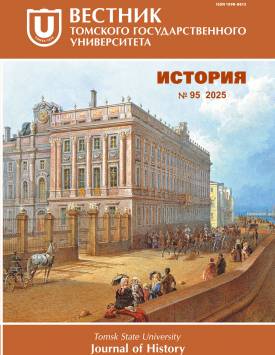Lashmans and changes in the structure of Departmental management in the second quarter of the 19th century
The article deals with a poorly studied topic of the Lashmans transferring from the State Department competence under the Appanage Department management; Lashmans are a special social group of the population engaged in logging for the Russian fleet needs. The research is based mainly on archival sources stored in the Russian State Historical Archive Fund of the Appanage Department (f. 515). Many sources are introduced into scientific circulation for the first time. In the second quarter of the 19th century the Imperial Court Ministry initiated territorial exchange between the Government and the Appanage Department for more compact concentration and administrative activities convenience. Such exchange was supposed to reduce the costs of Appanages properties managing that belonged to the members of the Imperial Family on the rights of conditional ownership. Many researchers consider that such exchange was beneficial to the Appanage Department, but it was unprofitable for the Government. During the territorial exchange not only real estate was transferred, but also peasants, lashmans, odnodvortsy and plowed soldiers living on these lands. The change in legal affiliation has brought to changes in the department management structure. The Lashmans have become the object of our research. Thus, the possibility of Lashmans transferring to appanage peasants was discussed. As a result, it was decided to preserve their social status. Formally they were under the control of the Appanage Department, but at the same time they carried out their duty to supply timber for the fleet needs. The Appanage authorities themselves paid the incomes and taxes for Lashmans to the treasury. Significant changes have touched the economy and life of Lash-mans. Firstly, they were obliged, like the rest of the peasants, to start a public plow to fill bread shops, and that caused an intense protest. Secondly, the control over the forests was established. The Lashmans understood the use of forests quite freely, that’s why they gradually cut them down for personal needs. The Appanage Department counted all the woodlands and put them on the Department balance. Now the Lashmans could not use the forest uncontrollably, as it was in the opinion of the local authorities before that. Thirdly, the vast majority of Lashmans were Muslims. Provokers appeared among them. They spread rumors and written documents about the forcible Lashman transferring to Orthodoxy and the prohibition of polygamy. All these reasons led to thousands of protests, which were stopped only with the help of military teams. The author declares no conflicts of interests.
Keywords
Lashmans, Appanage Department, the Russian Empire, 19th centuryAuthors
| Name | Organization | |
| Krasnikova Yulia N. | Saint Petersburg State University | julia2404@mail.ru |
References

Lashmans and changes in the structure of Departmental management in the second quarter of the 19th century | Tomsk State University Journal of History. 2025. № 95. DOI: 10.17223/19988613/95/5
